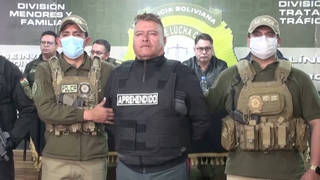
Topics
The U.S. pressured the Bolivian government to declare a war on coca and the people who grow it. Evo Morales, the most powerful opposition leader in Bolivia and the first coca grower to be elected to congress is fighting back.
Bolivia’s embattled president Gonzalo Sanchez de Lozada secured a majority coalition in Congress on Tuesday.
The alliance with the New Republican Force, one of the biggest opposition groups, gives the ruling coalition enough votes to pass most laws and approve state appointments.
Bolivia is the world’s third-biggest producer of coca, the leaf used to make cocaine.
Pressured by the U.S. the white-dominated Bolivian government has declared war on coca and the people who grow it — known as cocaleros. Two thirds of Bolivia’s population is indigenous.
Bolivian governments since the 1990s have hacked down and uprooted thousands of acres of coca plants, mostly in the Chapare region.
In 1997, Evo Morales was the first cocalero elected to congress. Morales is the leader of the Movement Toward Socialism party. He organized blockades and closed highways to protest government policies toward coca growers winning concessions from the government.
In January 2002, the white-dominated Congress expelled Evo. He ran for president a year ago coming in second, just one percent behind the winner. He remains the most powerful opposition leader in Bolivia.
- “Coca and the Congressman” — Documentary about coca growers in Bolivia. The excerpt is the leader of the Movement Toward Socialism party Evo Morales giving a radio interview in Bolivia.
- Jon Alpert, filmmaker and founder of Downtown Community Television center. He is recently back from Bolivia where he produced and directed the film “Coca and the Congressman” about the coca growers of Bolivia.
- Matthew O’Neil, director of programs and a producer at the Downtown Community Television center.
- Kathryn Ledebur, Director of the Andean Information Network and a consultant for the Washington Office on Latin America speaking from Cochabamba, Bolivia.











Media Options